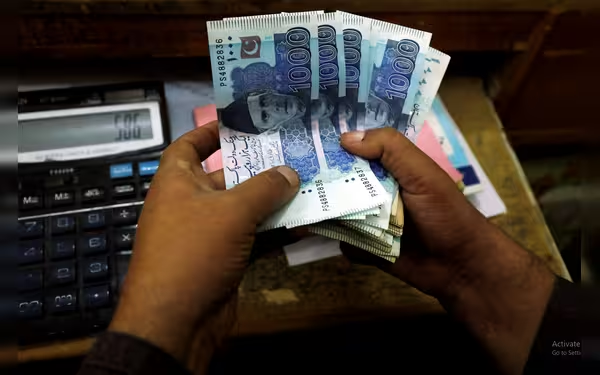Saturday, November 16, 2024 07:30 PM
Pakistan Government Borrowing Reaches Record High of 100.8%
- Government borrowing hits unprecedented 100.8% of GDP.
- Total borrowing from banks reaches Rs31.03 trillion.
- Excessive debt raises concerns over economic stability.
 Image Credits: tribune.com.pk
Image Credits: tribune.com.pkPakistan's government borrowing has surged to a record 100.8%, raising concerns about economic stability and long-term implications.
The financial landscape of Pakistan is currently witnessing a significant shift, as government borrowing has surged to an unprecedented high of 100.8%. This alarming figure reflects the government's increasing reliance on borrowed funds to meet its financial obligations. The situation has raised eyebrows among economists and financial analysts, who are concerned about the long-term implications of such high levels of debt.
According to the latest data from the State Bank of Pakistan (SBP), the government has borrowed extensively from commercial banks, which have lent a staggering Rs31.03 trillion. This amount is notably higher than the total deposits of Rs30.78 trillion held by these banks. Essentially, this means that the government is utilizing not only the funds deposited by the public but also additional borrowing from the central bank to cover its financial needs.
The implications of this borrowing spree are manifold. On one hand, it allows the government to fund essential services and infrastructure projects, which can stimulate economic growth. On the other hand, excessive borrowing can lead to a debt trap, where the government finds itself in a cycle of borrowing to pay off existing debts. This situation can create a precarious financial environment, potentially leading to inflation and reduced investor confidence.
Moreover, the reliance on central bank borrowing can have serious repercussions for the economy. It can lead to an increase in the money supply, which, if not managed properly, can result in inflationary pressures. As prices rise, the purchasing power of the average citizen diminishes, leading to a decline in living standards.
While borrowing can be a useful tool for managing short-term financial needs, the current levels of government debt in Pakistan are a cause for concern. It is crucial for policymakers to strike a balance between borrowing and sustainable economic growth. The government must explore alternative revenue sources and implement effective fiscal policies to ensure that the economy remains stable and resilient in the face of these challenges. As citizens, it is essential to stay informed and engaged in discussions about our country's financial health, as it ultimately affects us all.













